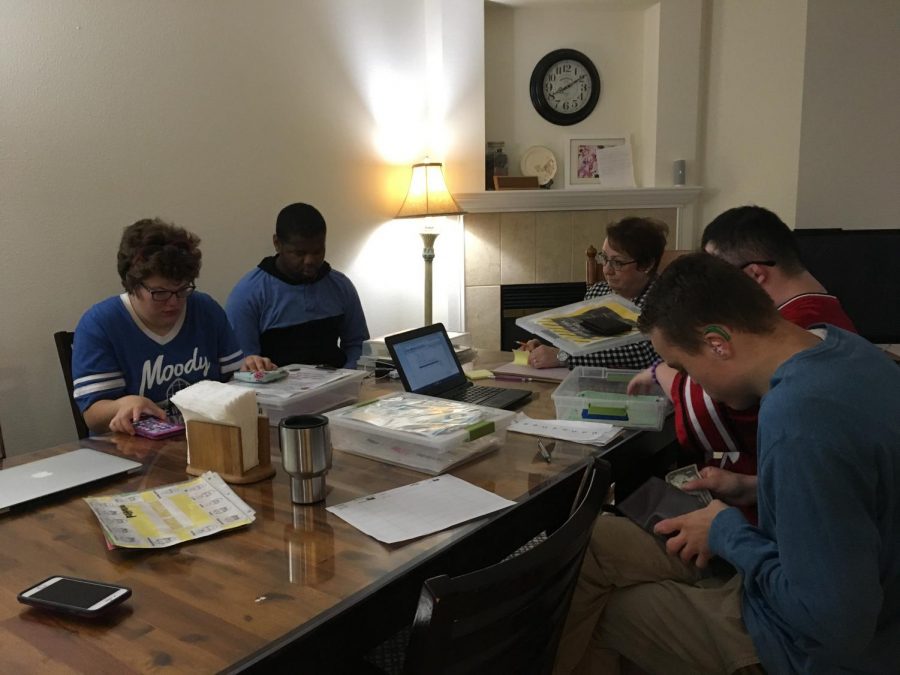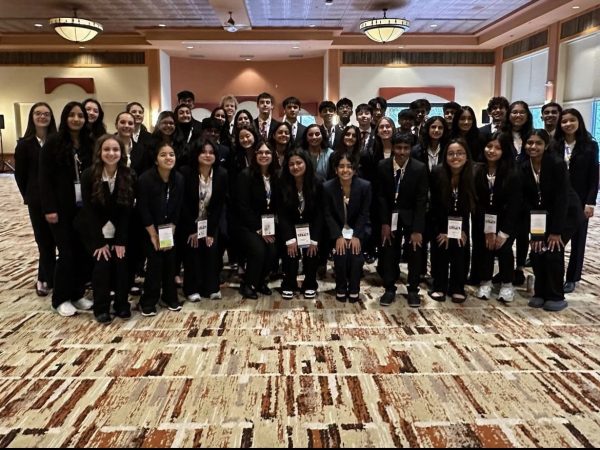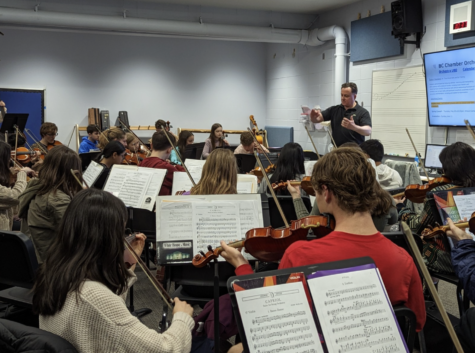Project STRIVE: shaping futures one step at a time
From left to right: Melissa, Elijah, Megan Rindal, Brandon (back), and Brendan. Project STRIVE participants plan out their week with Transitional Coordinator Megan Rindal. Rindal hopes to help the students generalize their learned skills from classroom to home environments.
Meet Elijah, a graduating senior of Project STRIVE (Specialized Transition Recreation Independent Living & Vocational Experiences). He plans to find a job with the help of the DVR (Division of Vocational Rehabilitation) after he graduates. It took three years, but with the help of Project STRIVE, Elijah has been equipped with almost everything he needs to be an independent.
This is what Project STRIVE aims to do. “Students with disabilities can stay in high school until they’re 21, or until the end of the school year in which they turn 21,” Megan Rindal, Transitional Coordinator of Project STRIVE, explained. “When they were staying in the school building until 21, they were struggling to generalize the skills that we were teaching, from the classroom to home and community environments.” Essentially, Project STRIVE is intended to bridge the gap between theory and practice.
“For those of us that have typical functioning brains and neurology, we take for granted that we’re just going to learn how to budget eventually and we’re going to take care of ourselves in terms of grocery shopping and running errands and socializing and finding recreational activities in the community,” Rindal continued. “But some individuals need some more support with that.”
Since Project STRIVE is about teaching skills useful in the real world, it doesn’t operate out of a normal classroom. Instead, the eight members currently enrolled meet at a two-bedroom apartment in Brookfield Hills. It has all the commodities of one, too. A whiteboard with the day’s schedule hangs above the breakfast table and the kitchen is covered with instructions and reminders of how to use it.
“There’s a lot of routine that everybody works through, but individually, they’re all going to have different goals and different pathways to help them get to those,” Ali Yenter, lead instructor of Project Strive, said. “Every individual will set their own goals.” The idea of having such strict routines is to build lasting habits. All the skills that the Strivers learn are vital to living independently, so it’s better to commit them to habit as quickly and efficiently as possible.
While Project STRIVE’s goal is to give their students experience in the community (outside of school), they need to pay for utilities like any other apartment-dweller would. “We need the money to pay for internet, group meals, and students that have financial need,” Rindal said. “Just like with running any household there are needs, like cleaning supplies, any additional costs that come up, if we need a new TV or computer or iPads or whatever for the apartment or the students.”
Their fundraiser is going to be November 8, starting 6 p.m. at the Marriott Milwaukee West. It is one of Project STRIVE’s sources of money, apart from what the district gives them. This year, they will have silent, raffle, and live auctions, in addition to food and music. The Strivers always contribute to the live auction with a painted adirondack chair to represent the theme of the year. “We’re going with family and friendship,” Yenter said. The design is a tree with eleven leaves, representing the members and staff of STRIVE.
In addition to the auctions that will be held, Elijah will be speaking at the fundraiser about his three years at STRIVE and the knoweldge he has gained over this period of time. He will be joined by his friends, fellow graduates, and alumni of the program who are successfully living as independent citizens in the current society. “I’m excited about the speech and to talk about the skills I’ve worked on,” he commented. “It’s cool how far my relationships have come. We’re just like a family.”
Julianne Sun is currently the Print Director at Tyro and a Sophomore at Brookfield Central High School. She is also involved in Battle of the Books, DECA,...












